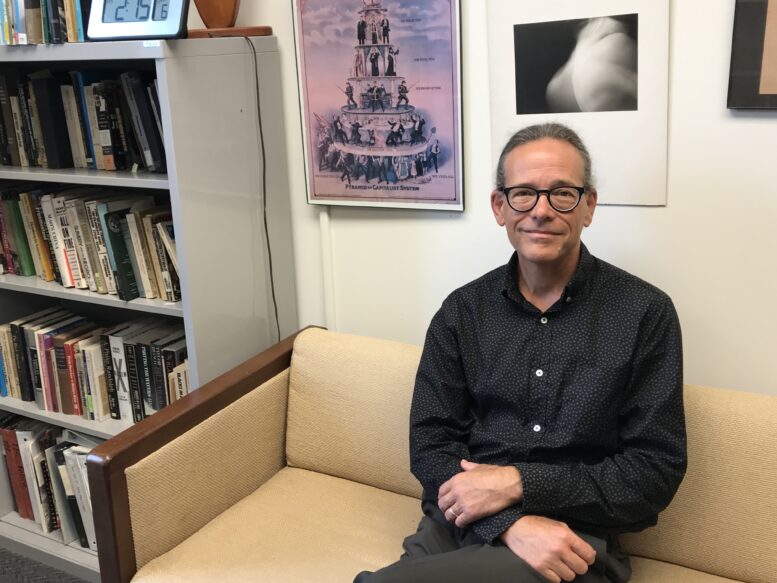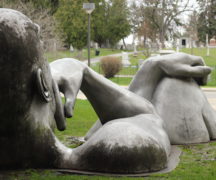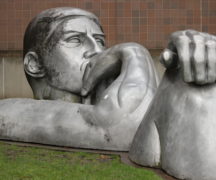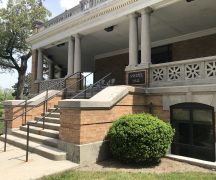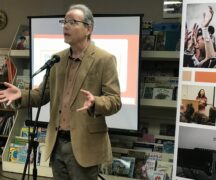By DAVID DUPONT
BG Independent News
When Timothy Messer-Kruse was putting together materials for his merit document, he did a Google search on himself – not something he regularly does. That’s he when discovered his name was on the Turning Point USA Professor Watchlist.
He’s the only BGSU faculty member on the list.
According to Turning Point USA’s website:
“The mission of Professor Watchlist is to expose and document college professors who discriminate against conservative students and advance leftist propaganda in the classroom. Professor Watchlist is a carefully aggregated list sourced by published news stories detailing instances of radical behavior among college professors.”
The listing on Messer-Kruse actually documents no instances of radical behavior, rather quotes from op-ed pieces he’s published over the past several years.
Those opinion pieces were “about the Ohio GOP’s crusade to censor campuses,” he said. “Some of those clearly got under some key legislators’ skins. … .. They don’t accuse me of anything but publishing my thoughts.”
[RELATED: BGSU professor: In proposed higher education law, Ohio Republicans have gone ‘woke’]
State Sen. Jerry Cirino mentioned him by name in a response to three letters from academics about the impact that SB 83 would have on campuses. Cirino wrote the concerns were overstated.
“The thing that disheartens me the most,” Messer-Kruse said, “is if you look at who is on (the watchlist) and the complaints they make they don’t allege that they are engaged in some kind of ideological campaign on campus.”
One of the many listed is a professor of practice at the University of Virginia. Liz Cheney, former member of Congress, is listed for her work on the select committee that investigated the Jan. 6 takeover of the U.S. Capitol which Turning Point called “the most peaceful protests.”
The list was started in 2016, and at that time, academics circulated petitions that gathered more than 1,500 signatures asking to be added to the list as an act of solidarity. Messer-Kruse said he remembers the petition but does not remember if he signed.
His BGSU colleagues have offered similar shows of support. While this are posed sometimes in a light-hearted matter, Messer-Kruse has concerns.
In 2015, he was attacked after emails he’d written opposing loosening the regulations about carrying guns on campus were made public. “I know there are consequences to it ,” he said. “There are dangers to it. It’s not just a badge of wokeness honor. There are people out there who can take his very far.”
He wants his name to be removed from the list.
He’s reached out more than a week ago to the BGSU chapter of Turning Point USA but hasn’t heard back.
He’s considering legal action against Turning Point USA.
The recent legislation proposed that would restrict what could be taught, Messer-Kruse said, is worse than in the McCarthy Era. “The difference is even in the era of McCarthy teaching about (Communist ideas) was not to be prohibited, only advocating them or professionally aligning yourself with Communism,” he said. “Now they are merely saying even discussing these ideas, even mentioning them, even putting them on your syllabus, is somehow inappropriate. It really undermines the whole academic project. If we can’t talk about these ideas, we have no mission. That’s the dangerous part of it.”
Messer-Kruse has taught Ethnic Studies for 17 years at BGSU, and before that in the History Department at the University of Toledo. In all those years, his students have filled our teacher evaluations. They’ve complained about their grades, or the amount of required reading, or his “bad jokes,” he said. “I don’t know that a single one of them has complained that I tried to indoctrinate them into some kind of left-wing ideology,” he said.
He finds it odd that he has been singled out. He’s been profiled by both the liberal publication Atlantic and the conservative National Review.
The work that has attracted the most popular attention is his book “The Haymarket Conspiracy: Transatlantic Anarchist Networks,” which challenges the accepted story that eight men were wrongly convicted for their role in a bombing that killed a police officer and sparked a riot in which other strikers and police died.
He feels he has “substantially debunked” the narrative embraced by those on the left, and repeated in news accounts every Labor Day. His contention from reading the trial transcripts and researching the context of the anarchist movement is that the prosecution had a significant amount of evidence that there was a conspiracy.
That book was a bit of a side trip in research interest. “My research has been involved in issues of race and ethnicity,” he said. His work has always focused on race and racism and the development of America, including the labor movement. His forthcoming book is on slavery and the U.S. Constitution.
In spring 2022, he taught a graduate seminar on Critical Race Theory, a target of right-wing activists, to demonstrate it was “a legitimate area of academic pursuit,” he said.
“It was organized around having the most renowned scholars around critical race theory here every week.” The 14 scholars spoke via Zoom. Students turned the proceedings into a podcast.
[RELATED: BGSU seminar launches podcast to provide insight into Critical Race Theory]
“There were some who were critics,” Messer-Kruse said of the speakers. “I sought them out. We did the best we could to play both sides of the field. … I did dig out those who were most critical, and those who had critical things to say about aspects of CRT even though on the whole they find it more useful than not.”
In the fall 2022, he followed it up with another class that took “a fine-grained look” at the criticism of Critical Race Theory.
He has concluded that “a lot of the criticism of CRT boils down to an attack on the project of academia, and the project of the humanities, and that’s why I think it is even more dangerous than an ideological campaign like McCarthyism. … This is a wholesale assault on intellectual investigation of ideas and the world.”

